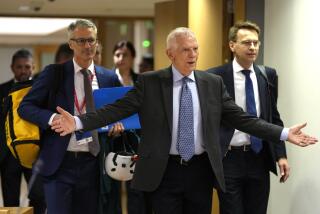House Committee Looks at Russian Money Scandals
- Share via
WASHINGTON — Jumping into the furor over alleged Russian money laundering, a congressional committee Tuesday heard testimony ranging from comforting words from the Clinton administration to allegations that international aid money was stolen.
Treasury Secretary Lawrence H. Summers, defending the administration’s stance toward Russia as “hardheaded and prudent,” said it was premature to say whether Russian criminals had made off with International Monetary Fund loans that were intended to prop up the national economy.
“I think it is misleading to suggest on the basis of the evidence that is available at this point that there have been direct diversions of IMF dollars that should have been used for reserves in the foreign exchange market--to some entirely different purpose,” Summers told the House Banking Committee. The committee plans a series of hearings throughout the fall.
But Richard L. Palmer, a 20-year veteran of the CIA who now runs a private investigative firm specializing in Russia, presented a darker version of events.
“Claims that there is no evidence of the theft of these funds are grossly misleading,” he said of a $4.8-billion IMF loan in 1998. “The IMF is correct in stating that they have no evidence of stolen or misused funds, if only because the Russians did not deliver them evidence to the contrary on a platter.”
Palmer, who said he maintains broad contacts in Russia, said the bulk of the $4.8 billion was used by 18 Russian and foreign banks to convert their rubles into dollars shortly before Russia devalued its currency in the summer of 1998.
Summers acknowledged that investigators faced a daunting task in unraveling the path of international aid money after it entered the Russian financial system: “It is difficult or really impossible to identify what in some sense the ultimate use of a particular dollar is.”
Summers said the United States will support future international aid to Russia only if that country implements a series of safeguards, including an investigative report on the offshore operations of its central bank, and establishes new controls on the management of central bank cash reserves.
The administration and members of Congress also are preparing new proposals that would make it harder for foreigners to exploit the U.S. banking system for money laundering, in which criminal profits are made to appear legitimate by being passed through various financial transactions.
Banking Committee Chairman James A. Leach (R-Iowa) unveiled what he called the Foreign Money Laundering Deterrence and Anticorruption Act. The administration plans Thursday to release a new set of proposals to combat money laundering. The package will include efforts to foster international cooperation and requirements that storefront check cashers, brokerage firms and casinos notify authorities of suspicious activities.
Russian officials, who have complained that the scandal is being whipped up to influence next year’s U.S. presidential election, watched the hearing closely. President Boris N. Yeltsin said nothing about the issue, and he was briefed by Nikolai P. Patrushev, director of the Federal Security Service, the successor to the KGB.
Separately, Switzerland’s government announced Tuesday that Swiss banks have frozen $16.8 million in accounts suspected of being linked to the Russian case.
*
Times staff writer Maura Reynolds in Moscow contributed to this report.
More to Read
Get the L.A. Times Politics newsletter
Deeply reported insights into legislation, politics and policy from Sacramento, Washington and beyond. In your inbox twice per week.
You may occasionally receive promotional content from the Los Angeles Times.








